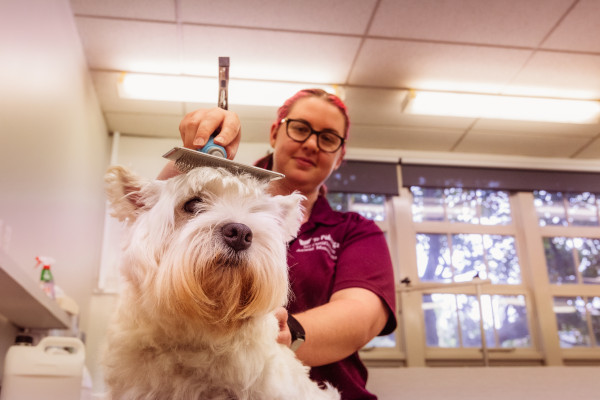Haere mai! Welcome to the information page for the
New Zealand Certificate in Animal Management (L4) – Pet Grooming
APL Pathway

The qualification document from the New Zealand Qualifications Authority can be found HERE.
1. What is APL?
If you have regularly engaged with continuing professional development and training, and are constantly reviewing your professional pet grooming practices to identify opportunities for improvement, you could gain academic recognition and a qualification for your knowledge and experience.
Introduction to APL for School of Animal Health
2. What does APL stand for ?
Accreditation of Prior Learning.
3. Why do we assess through APL ?
We recognise the value of experience. The School of Animal Health APL process centres around you and your career.
4. What does the APL process involve ?
We reflect on where you have come from, where you are now and where you want to head next.
5. Duration
Compilation of the evidence portfolio and presentation for assessment is 10 months part time. Part time study entails approximately 17-20 hours per week. In total you can expect to spend approximately 400 hours on your evidence portfolio.
6. Delivery
Flexible Facilitated Online.
7. Who can apply for the APL pathway?
- 5 or more years of professional pet grooming experience.
- Relevant academic records (if any).
- A copy of your Curriculum Vitae.
- Support from professional pet grooming colleagues.
- Please email us at animalhealth@op.ac.nz with all the information mentioned above. We will then schedule a time for you to talk with our APL team and determine if this process is suitable for you.
8. How does it work?
Your facilitator will guide you through ten tasks which make up your evidence portfolio.
9. How is it assessed ?
A key part of this programme is those in-depth case studies where you evaluate your learning experiences from your career and present an evidence portfolio to demonstrate how you meet the requirements of the programme.
10. What support does Otago Polytechnic offer?
Facilitator:
A facilitator supports you by guiding you through the process of each of the ten tasks, identifying and articulating your existing skills and knowledge. The facilitator helps you reflect on your experiences, align them with academic or professional standards, and effectively present this evidence for assessment, ensuring you demonstrate both your prior learning and your new learning.
Access to Moodle:
Moodle is an on-line platform that helps people learn by providing access to a wide range of educational resources. If you are studying through Assessment of Prior Learning (APL) and want to learn more about a particular topic, Moodle allows you to explore new information and deepen your understanding. It is like an on-line library where you can read and learn at your own pace, without needing to complete tasks or upload assignments. It is a great tool for discovering new knowledge and filling in any gaps in what you already know.
11. Tasks
To achieve in the Certificate in Animal Management (Pet Grooming) Level 4 qualification, we will support you to:
- Identify early experiences and influences that have shaped you and how these relate to your working life as a pet groomer.
- Evaluate your work and life experiences and skills.
- Research relevant literature and reflect on how these have informed your pet grooming practice and influenced your work.
- Complete in-depth case studies that evaluate key learning experiences from your work and align these with relevant literature.
- Identify and fill gaps in your knowledge or experience and apply new learning.
12. Qualification Outcomes
Qualification outcomes are the specific skills, knowledge, and competencies that a learner is expected to have gained upon completing a particular qualification. They define what a learner should be able to do, understand, or demonstrate at the end of a course or programme, ensuring they meet the required standards for that qualification. As an APL learner, you are demonstrating these outcomes throughout your portfolio, showcasing how your prior experience and learning align with the qualification's expectations.
- Implement regulatory and compliance requirements for animal care and welfare.
- Apply knowledge of anatomy and physiology to relevant aspects of animal management.
- Manage interpersonal relationships and ethical behaviour in the provision of animal care.
- Maintain animal, human, and environmental safety in a pet grooming environment.
- Maintain an optimal welfare state of pets in a pet grooming environment.
- Manage variations to normal and abnormal health and behaviour of pets in a pet grooming environment.
- Apply knowledge of pet breed and individual characteristics, coat and body type, handling techniques, and the use and maintenance of grooming equipment to groom pets.
13. Overarching Outcomes
These are overarching conditions - they must be shown throughout your portfolio
- Programmes must recognise capabilities supporting environmental, social, and economically sustainable practices in animal care.
- Programmes must recognise the place of Te Tiriti o Waitangi/The Treaty, and capabilities supporting cultural sensitivity and responsiveness in animal care.
- Ensure currency with amendments to, and replacements of, relevant legislation, regulations, and codes of practice which may include some or all of the following: Animal Welfare Act 1999; Health and Safety at Work Act 2015; Hazardous Substances and New Organisms Act 1996; Resource Management Act 1991; Agricultural Compounds and Veterinary Medicines Act 1997, Privacy Act 2020.
- Ensure the Animal Welfare Act 1999 Part 6 legislating ethics surrounding use of animals in learning and teaching, including seeking Animal Ethics Committee Approval where applicable is complied with.
14. Enrolment Information
Enrolment information will be provided once your suitability for APL has been determined by a School of Animal Health Staff member.
If you like the sound of the APL pathway but are not sure whether you have the required or relevant experience, please contact us. We are happy to talk through your options.
Email animalheath@op.ac.nz or call us at 0800-762-786 and ask for the School of Animal Health.
